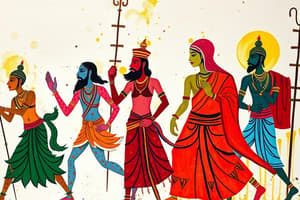Podcast
Questions and Answers
What are the examples of ancient Indian architecture mentioned in the text?
What are the examples of ancient Indian architecture mentioned in the text?
- The Qutub Minar and the Lotus Temple
- The stupas at Sanchi and the rock edicts of Emperor Ashoka (correct)
- The Taj Mahal and the Red Fort
- The Ajanta Caves and the Ellora Caves
Which concept is described as a defining characteristic of Hinduism in the text?
Which concept is described as a defining characteristic of Hinduism in the text?
- Nirvana
- Dharma (correct)
- Karma
- Reincarnation
What does the text say about the origin of Hinduism?
What does the text say about the origin of Hinduism?
- Hinduism was introduced to India by foreign invaders
- Hinduism emerged in the Mughal period
- Hinduism was created by the British during colonial rule
- Hinduism has its roots deeply embedded in ancient India (correct)
What is described as a key aspect of Hinduism in the text?
What is described as a key aspect of Hinduism in the text?
What do the Vedic texts provide evidence of, according to the text?
What do the Vedic texts provide evidence of, according to the text?
Flashcards are hidden until you start studying
Study Notes
Ancient India: Exploring Buddhism and Hinduism
Introduction
Ancient India boasts a rich and diverse history, marked by numerous significant events and cultural developments. Two of the most prominent aspects of this history are the emergence and evolution of two major religions: Buddhism and Hinduism. Both religions originated within a broader societal framework characterized by urban expansion, political organization, and advanced knowledge in various domains, including mathematics, astronomy, architecture, literature, music, and the fine arts.
Buddhism in Ancient India
Buddhism evolved from the teachings of Prince Siddhartha Gautama, who lived in the eastern part of ancient India between approximately 563 BCE and 483 BCE. He is believed to have reached enlightenment while meditating under a bodhi tree, a significant event that marked the beginning of his career as a teacher and spiritual leader. His teachings, known as dharma, constitute the foundation of Buddhist philosophy and ethics.
One of the most notable aspects of Buddhism in ancient India was the establishment of the Sangha, an organizational structure that supported the growth and dissemination of Buddhist practices and teachings. The Sangha played a crucial role in preserving and spreading Buddhism across the Indian subcontinent and beyond.
Some of the most important Buddhist monuments from this era can still be seen today, reflecting the richness and diversity of artistic expressions during this period. Examples include the stupas at Sanchi, near Bhopal in Madhya Pradesh, which are decorated with intricate carvings, and the rock edicts of Emperor Ashoka, scattered across different parts of the Indian subcontinent.
Hinduism in Ancient India
Hinduism, too, has its roots deeply embedded in ancient India. Its complex history can be traced back to the Harappan civilization and the Vedic age. Hinduism encompasses a wide range of beliefs, practices, and philosophies, all of which owe their origin to the cultural landscape of ancient India.
One of the defining characteristics of Hinduism is the concept of Dharma, which refers to the moral order of the universe and the duties and responsibilities of individuals within society. Another key aspect is the belief in karma, where actions determine future destiny.
Various Hindu gods and goddesses emerged during this period, forming an extensive pantheon of deities associated with different aspects of nature, human emotions, and cosmic forces. The Vedic texts provide evidence of the worship of these deities, revealing the richness and diversity of religious practices in ancient India.
Conclusion
In summary, ancient India served as the cradle of two of the world's most influential religions - Buddhism and Hinduism. Both religions emerged from a broader societal context characterized by urbanization, political organization, and advanced knowledge in various domains. The legacies of these religions continue to shape the cultural and spiritual landscape of India and its neighboring countries, highlighting the enduring influence of ancient India on the world.
Studying That Suits You
Use AI to generate personalized quizzes and flashcards to suit your learning preferences.




